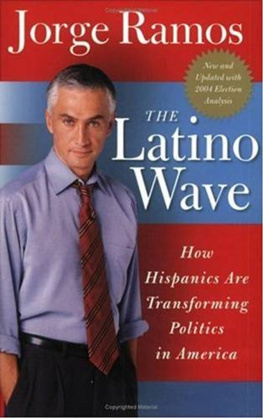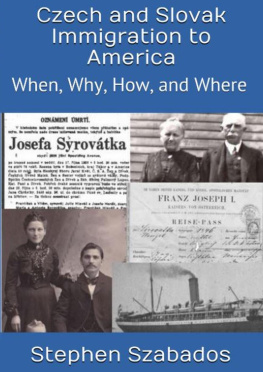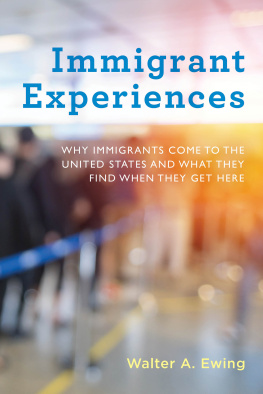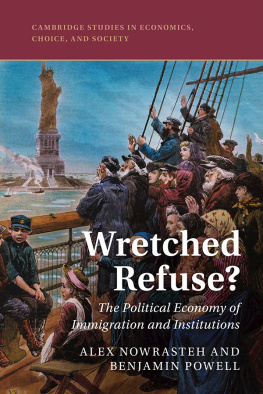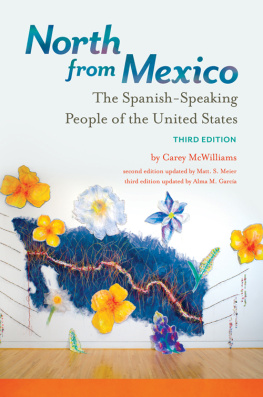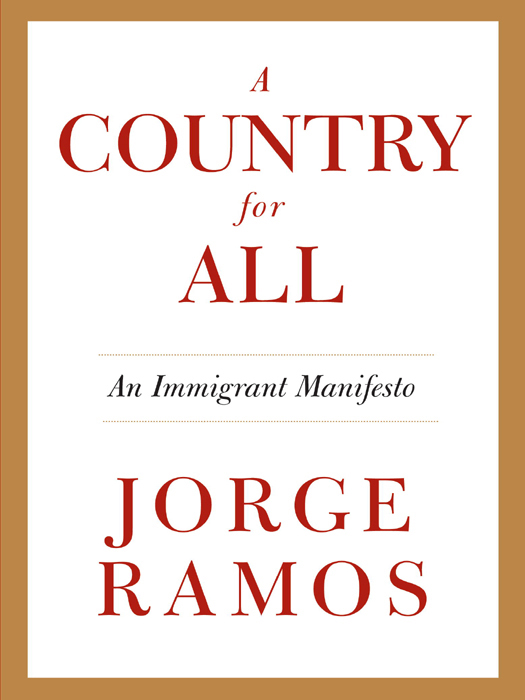Jorge Ramos, born in Mexico City, is an award-winning journalist and author. He is coanchor of Univisions nightly newscast, Noticiero Univision, and hosts Al Punto, the networks Sunday morning political show. Ramos also writes a weekly column distributed by the New York Times Syndicate and contributes daily analysis on Univision Radio.
He appears frequently on ABC, CBS, NBC, and CNNamong other networksin defense of immigrant rights. He has been named one of the Most Influential Hispanics in America by Time magazine, and he is the recipient of eight Emmy Awards and a Maria Moors Cabot Prize for excellence in journalism. This is his tenth book.
Ramos has lived in the United States for more than twenty-five years. He has two children, Paola and Nicols, and resides in Miami.
That all men are created equal.
Declaration of Independence, 1776
The happy and the powerful do not go into exile.
Alexis de Tocqueville, Democracy in America
Little is more extraordinary than the decision to migrate.
John F. Kennedy, A Nation of Immigrants
We must take sides. Neutrality helps the oppressor, never the Victim. Action is the only remedy to indifference, the most insidious danger of all.
Elie Wiesel, Night
The time to fix our broken immigration system is now.
Barack Obama, May 23, 2007, U.S. Senate
INTRODUCTION
Here is not merely a nation, but a teeming nation of nations.
WALT WHITMAN , Leaves of Grass
Now is the time.
For millions of immigrants in the United States, their worst nightmare is becoming a reality.
President Barack Obama has not fulfilled his promise to create an immigration bill by the end of his first year in office. In fact, the rate of deportations has increased since the Bush administration. During fiscal year 2009, 387,790 immigrants were deported or left the United States voluntarily. Even worse, anti-immigrant sentiment in this country continues to grow.
Arizona has become ground zero in the immigration debate. On April 23, 2010, Governor Jan Brewer signed SB 1070, creating a law that, according to its critics, amounts to institutionalizing the practice of racial profilingin other words, legalized racism. This law makes it a state crime for any person to be unable to produce proof of citizenship at all times, or to provide aid or transportation to an undocumented immigrant. It also authorizes the police to act as immigration agents by detaining anyone they suspect may be living in this country illegally. This is, unquestionably, the most anti-immigrant legislation in the United States. If there is any silver lining to what happened in Arizona, it is that the issue of immigration reform has been placed front and center on the national stage with a renewed sense of urgency. The possibility that similar laws might be passed in other states has reignited the immigration debate nationwide.
The Arizona law reveals that discrimination is still present in our so-called postracial society. It also means that the Republicans who favored the bill havent learned from their electoral mistakes and Hispanics will continue to vote against them.
Any immigration reform requires presidential leadership. But there is a growing sense of grievance in the Latino community toward Obama. Many Hispanics believe that if the president had fought for immigration reform with the same determination he showed during the health care debate, Arizona might never have signed SB 1070 into law. President Obama has described it as misguided and even many Republicans have expressed serious concerns about it. The fact is, SB 1070 is Arizonas response to the federal governments inaction.
Both parties have said time and again that the immigration system is broken but neither has made a substantial effort to pass a bill. In early 2010, Representative Luis Gutierrez (D-Ill), and Senators Harry Reid (D-NV), Charles Schumer (D-NY), Bob Menendez (D-NJ), and Lindsey Graham (R-SC) presented three different immigration frameworks. All three included new enforcement rules and a path to citizenship. However, none of the frameworks had the support of the Republican Party or the votes to pass in either chamber of Congress.
Politics prevailed and nothing was done.
The U.S. immigration system is unsustainable. We have waited for two decades for some kind of real reform.
And we are still waiting.

The life of Alfredo Quiones-Hinojosa is an inspiring example of what an undocumented immigrant can do in the United States when given the opportunity.
Alfredo came to the United States as an undocumented immigrant in 1987. He was just nineteen years old, and one of six children. I was hopping back and forth, he told me, between Calexico (in the United States) and Mexicali (in Mexico). All I wanted to do back then was provide food and basic living essentials to a very poor Mexican family.
Alfredo crossed over the border without the aid of a coyote, or guide. His family didnt have the six-hundred-dollar going rate to hire one at the time.
His first job was as a farmhand, cultivating tomatoes, chili peppers, and cotton in central Californias San Joaquin Valley. He earned $3.35 an hour. Later, he moved to a small city, where he tried his hand at other jobs: sweeping floors, shoeing horses, and soldering metal. That was where he learned English, and eventually he applied and was accepted to a local community college.
His next big step was when he accepted an offer to study at the University of California at Berkeley. Alfredo dreamed of becoming a doctor, and nothing was going to stop him.
His grandmother in Mexico had been a midwife and an herbal healer, and it was she who inspired his interest in medicine. Ive had many examples to follow in my life, but I know she played a very important part, he remarked. My grandmother was an incredibly respected person, not just by her friends and family, but also in that little agricultural community that existed there on the outskirts of Mexicali, in Baja California.
After graduating from Berkeley, Alfredo was accepted to Harvard Medical School, where he graduated with honors. He then returned to California to complete his residency in neurosurgery at the University of CaliforniaSan Francisco.
Remember, he made a point of saying, Cesar Chavez said that one of the main problems we face is the fear of failure. We dont have to be afraid of failure. And I didnt have anything to lose. This young man, who started his working life harvesting cotton in the fields, now serves as the director of the brain tumor program at the Johns Hopkins Bayview campus.


